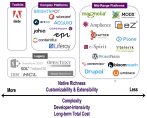From Vignette to Microsoft - Web Content Management Orthodoxy
Below is an excerpt from an interview I had with with Australian journalist David Walker. I thought it worth re-publishing here too. In a wide ranging chat undertaken whilst I was grumpy and jetlagged we discussed amongst other things Interwoven (now Autonomy soon to be HP), Vignette (OpenText), and Microsoft.
Orthodoxy:
You must have sophisticated Web content management
Pelz-Sharpe: In fact, a high-cost system may cost far more than it gives you. "A lot of the time, there's no business value," he says. The business's intranet, for instance, may be a collection of disparate documents; even its public Web site may have inconsistencies. "Does that really hurt? For some companies it's absolutely critical, but for a lot of companies less focused on delivering content, it's not hurting them."
Orthodoxy:
You can buy systems that will solve all your content management problems
Pelz-Sharpe: In fact, most available content management systems leave you with a lot of work to do. "Most vendors don't have the full solution," he says. A year or two ago, vendors could skate over that in sales presentations. Now buyers are wising up to the systems' weaknesses. The market leaders have created enough disappointment that Pelz-Sharpe acknowledges it risks creating ill-will.
Orthodoxy:
Content management systems must use XML
Pelz-Sharpe: Measured against the hype surrounding its initial release, XML has made little impact on businesses. Right now, it leaves many crucial content management questions unanswered. A few years from now, says Pelz-Sharpe, XML will be viewed as "just another tool." For now, most organizations will continue to put their content in that proven 1970s-era container, the relational database.
Orthodoxy:
Content management systems must use Java
Pelz-Sharpe: "A lot of this stuff is over-engineered." In fact, lightweight scripting tools better suit content management in all but the largest and most complex sites. The well-regarded but expensive Java content management systems have helped automate Web sites such as The Age and the Financial Times. But as Pelz-Sharpe notes: "There are only so many FT.coms out there." Most businesses need a cheaper, simpler solution.
Orthodoxy:
Content management systems must personalize pages, catering to an "audience of one"
Pelz-Sharpe: Today's sites often aim to create unique Web experiences for each visitor -- but this personalization just doesn't work. Personalization's cheer squad loves to point to Amazon.com, but Pelz-Sharpe argues the online book store has enjoyed a uniquely long learning curve, large budget, and rich stream of purchase data from book-buyers. Almost every other business will do better to segment its audiences into broad groupings - the well known market segmentation approach -- rather than catering vainly to "audiences of one."
Orthodoxy:
Intranet content management should "e-enable" the business at every level
Pelz-Sharpe: The most successful intranet users are addressing not complex needs but simple ones -- like helping users find out how much holiday leave they have. "It's very simple stuff. You can do it and cut costs. You start to get buy-in with these simple things. The problem for the (intranet system) vendors is that they are brilliant, but they are delivering far too much."
"Keep it simple" hasn't been popular advice during IT's heady dot-com years. In Web content management, at least, it may be making a comeback.
The interview was conducted more than 10 years ago in May 2001 ....... makes you think eh?








